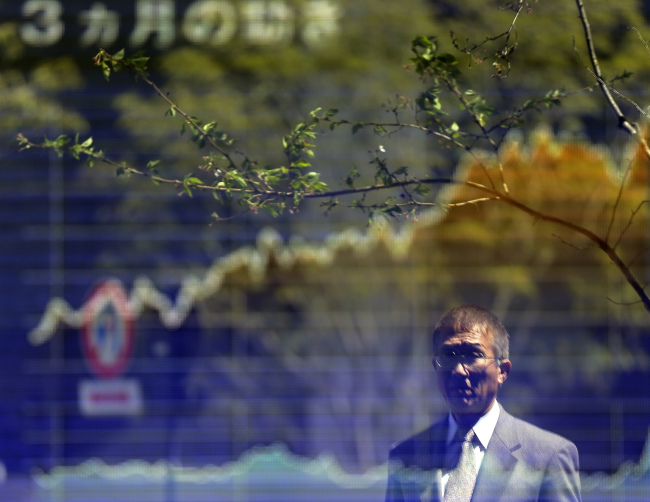The Bank of Japan’s decision last week for aggressive monetary easing shook the global markets, further paving the way for a weaker Japanese yen, as intended.
The plan by the Japanese central bank aimed at tackling deflation and spurring growth included a surprisingly large amount of government bond purchases equivalent to 10 percent of its gross domestic product.
The new BOJ Governor Haruhiko Kuroda did not waste time by hinting its course of action, but instead sent a direct and clear message that it would do all it could with its monetary tools to revive its economy that has been stagnant almost two decades.
 |
A man looks at an electronic stock board of a securities firm in Tokyo Monday. (AP-Yonhap News) |
Its quantitative easing is in line with Prime Minister Shinzo Abe’s earlier announced goals of 2 percent inflation, which the central bank has for set a timeline target of two years.
Its policy of pumping money into the market that has already effectively weakened its currency ― which analysts forecast to reach 100 yen against the dollar soon ― may be good for Japan, but tough for the Korean economy.
Now faced with a double whammy of North Korea’s provocations and Japan’s monetary easing, Korean manufacturers such as automobiles, electronics and steel that closely compete with their Japanese peers globally are in for a fierce marketing war.
“Japan’s monetary easing has increased the Korean burden, as well as concerns of a (possible) export slowdown,” said Lee Sang-jae, an analyst at Hyundai Securities.
“Korea may likely come up with stronger measures that can buffer its exports against the weakening yen.”
Finance Minster Hyun Oh-seok said that Japan’s monetary easing was inevitable, adding that although it is not appropriate to make comment on the currency market, Korea will devise measures against exchange volatility for small and medium enterprises.
In a report by Samsung Securities, the operating profit of the 43 top listed companies, which accounts for 50 percent of the market cap, could decrease about 3 percent should the yen-dollar exchange rate reaches 110 yen. Their combined sales are expected to fall by almost 2 percent in the same situation.
A weaker yen would be especially tougher on companies such as Hyundai Motor in the global automobile sector where Japan’s Toyota and Honda are already making headways, and POSCO in the steel space where it competes with Nippon Steel & Sumitomo Metal and JFE.
The Japanese currency has shed to near 98 yen following its monetary easing policy that also aims to put an end to falling asset prices as they discouraged private spending and investment.
“A weakening yen boosts exports, which are an important growth driver. Corporate profitability will also benefit, although to boost growth companies would need to hoard less cash and invest more in the domestic market,” said Moody’s Investors Service in a report.
“If it fails to induce growth or destabilizes the functionality or confidence in the Japanese government bond market, real JGB yields will rise and increase future funding costs,” it added.
By Park Hyong-ki (
hkp@heraldcorp.com)








